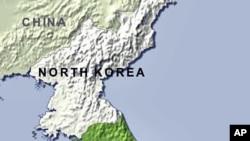The Obama administration's short-term goal is to get North Korea back to the so-called, six-party talks. Its long-term aim is to have North Korea give ups its nuclear weapons program.
Since 2003, Washington has been trying to persuade North Korea to eliminate its nuclear weapons capabilities. That effort has been conducted through the negotiating forum known as the six-party talks, bringing together the United States, China, Russia, Japan, South Korea and North Korea.
Pyongyang withdrew from the talks last April after the international community condemned its testing of a long-range ballistic missile. It also expelled international inspectors and restarted its plutonium factory. And in May, North Korea tested its second nuclear device.
But during the past few months, Pyongyang has sent signals indicating it may be willing to rejoin the six-party talks. This led to the recent visit to Pyongyang by the U.S. envoy for North Korea, Stephen Bosworth - the first high-level contact between Pyongyang and the Obama administration.
Addressing reporters following his trip, Bosworth said North Korea indicated it may return to the negotiating table. And he said Pyongyang also agreed to abide in principle by the 2005 accord that calls on North Korea to end its nuclear weapons program in return for security, economic and energy benefits.
"They have agreed as to the importance of the six-party process," he said. "They've indicated they would like to resume the six-party process. They have agreed on the essential nature of the joint statement of 2005. The other participants in the process see the situation in the same way. We all want to get back to the negotiating table. But when and how that might come about is something I just can't answer right now."
Former secretary of state Lawrence Eagleburger says the international community must act forcefully with North Korea.
"…making it very clear to the North Koreans that if they don't come back to the table and if they aren't reasonable, they are going to pay a price for it, potentially at least that we will use force to make our views known. There are ways in which we can do that, but we're not going to do that. And it probably wouldn't have international support if we did. So I doubt very much that this administration would be willing to go to the use of force against the North Koreans," he said.
Eagleburger says the U.S. can try to persuade the North Koreans to come back to the negotiating table.
"What is it we expect to get out of the six-party talks? And I'm not at all sure that we know anymore," he added. "The whole purpose of those talks, to begin with, was to prevent them from going in the nuclear direction. Well they not only went in the direction, but they ended up successfully [doing so]."
Many analysts say the road to an agreement with North Korea goes through China - Pyongyang's staunchest ally and greatest source of support in the international community.
But former CIA director and secretary of defense James Schlesinger questions whether Beijing is willing to be tough with Pyongyang.
"If the Chinese were prepared, seriously, to crack down and seriously to engage in sanctions, I think that that would change things," he noted. "But the Chinese have a higher priority, which is to preserve stability in the Korean peninsula and in particular to see to it that the North Korean regime does not collapse. They are fearful, among other things, of a wave of refugees coming over the Chinese border. And they are fearful of a unified Korea. And as a result, the Chinese say everything must proceed by negotiations and it's not clear that they are willing seriously to consider major sanctions against North Korea."
But former National Security Adviser General Brent Scowcroft sees encouraging signs.
"The United States and China are now working closely together with respect to North Korea, and I think that gives us the best opportunity for a solution," he said. "The Chinese Prime Minister, Wen Jiaobao, was there a couple of weeks or so. Now Steve Bosworth has been there. I think we are working together to, if you will, box the North Koreans in so that we have a better chance to get them back on the course of dismantling their nuclear facilities."
Many analysts say the ball is now in North Korea's court. Since Pyongyang has indicated its willingness to resume the six-party talks process, experts say the next step is to set a date.








